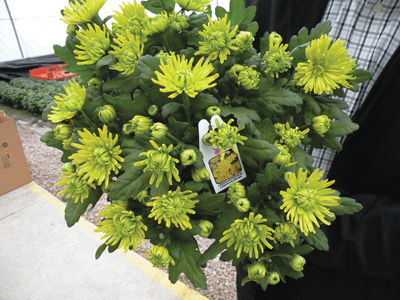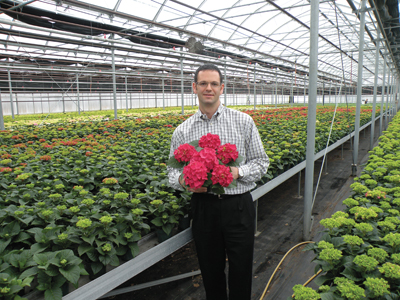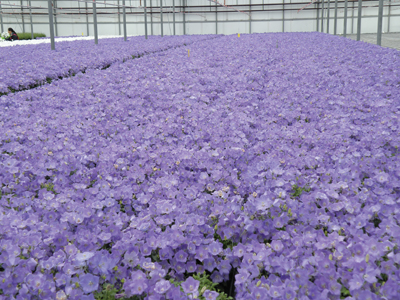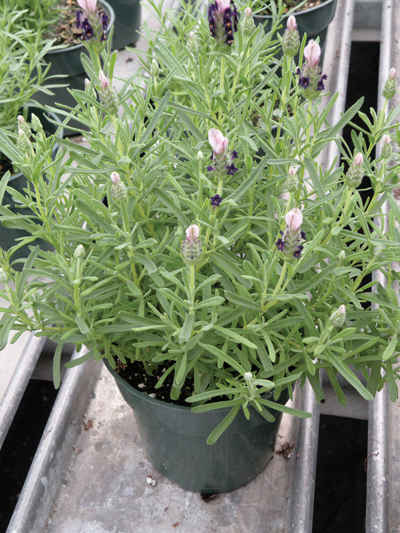
This year’s Canada Day will have special significance for one of the oldest greenhouse operations in Leamington.
This year’s Canada Day will have special significance for one of the oldest greenhouse operations in Leamington.
On July 1, Yoder Canada officially becomes Keepsake Plants, one of three divisions of Aris, the new name of Yoder Brothers.
Last fall, Yoder Brothers sold its potted and garden mum, aster
genetics and breeding programs, along with the Yoder brand name, to
Syngenta. As a result of the deal, Yoder Brothers needed a new name and
will become Aris on July 1. The corporate office will remain in
Barberton, Ohio.
The new holding company, Aris, will continue to operate Yoder Brothers’
three business units; they’re just being branded in a different way.
“We continue to provide the same services and products our customers
have come to rely on,” said president and CEO Bill Rasbach. “All that
has really changed is the company name. Although the mum and aster
genetics have been sold, we still know mums and we still offer them for
sale, along with our other product lines.”
The Aris divisions include:
| • | Aris Horticultural ServicesSM – Sales, marketing, brokered products, in Barberton, Ohio. |
| • | Keepsake Plants™ – Finished product for retailers/growers, in Leamington and Florida. |
| • | Green Leaf Plants™ – Young and pre-finished plants, in Lancaster, Pennsylvania. |
| • | Aris will also operate a breeding and production facility in Bogota, Colombia. |

|
|
| New this year is ‘Green Valley | |

|
|
| Keepsake Plants (Leamington) general manager Chris Jacobs, with a ‘Hot Red’ hydrangea. | |

|
|
| ‘Uniform Campanula’ production in Leamington. | |

|
|
| Lavender ‘Bella Rouge’ is a new addition to the Keepsake Plants lineup.
|
COMPANY HAS NEW NAME, BUT IT’S BUSINESS AS USUAL
It will be business as usual after the name change, say company officials.
“In our customers’ eyes, they really shouldn’t see any change,” says Keepsake Plants (Leamington) general manager Chris Jacobs. “The people, the quality and the service they’ve come to expect will remain the same.”
Keepsake Plants, he adds, is already well known in the North American market, “and that’s been our brand here at Yoder Canada for some time.”
The Yoder Canada (soon to be Keepsake Plants) facilities have deep roots in Canadian horticulture. It got its start as Atkin’s Flowers in 1925, before welcoming Yoder Brothers as a partner in 1965. In 1976, Yoder Brothers purchased the remaining shares of the Atkin family, and the name was changed to Yoder Canada.
“This has been a longstanding operation in this community,” says Jacobs, whose family owned a floral shop in Leamington for many years. Chris grew up not far from the Yoder-Atkin greenhouses, and began working for the company in 1996.
(It’s funny, he adds, how many people in town still refer to the company as Atkin’s Flowers.)
“MANY PEOPLE HAVE BEEN HERE FOR 20 YEARS AND MORE”
Thirteen years with a company seems like a long time, but at Yoder Canada, Chris is a relative newcomer. “I consider myself the new kid on the block,” he jokes. “It’s amazing how many people here have been with the company for 20 years and more.” There are some with seniority of more than 30 years.
The Leamington operation has 120 full-time employees, and 200 in peak seasons. Yoder Brothers president and CEO Bill Rasbach was a Yoder Canada sales rep in the 1970s.
“Our employees are among the industry’s most experienced,” says Jacobs, “with many former growers, production specialists and retail people. They’ve spent their entire careers ‘working the dirt,’ and standing in their customers’ shoes.”
That experience and expertise pays off. “Our staff are very knowledgeable, and our customers can continue to rely on our Aris Horticultural Services sales representatives, formerly Yoder Canada Sales,” notes Jacobs. They provide “a kind of safety net of expertise for many of the challenges our customers face.”
TWO EARLY BOOSTERS OF MASS MARKET SALES
Industry icons Jack Atkin and Bill Schwan both worked there. “When you talk about having flowering plants sold in the mass market channels,” says Jacobs, “Jack and Bill were the founding fathers, so to speak, in those Ontario and Canadian markets.”
In the early days, flowers were too often tucked away under the produce counter in supermarkets. Today, most stores devote entire departments to them, and in prominent locations.
Keepsake Plants has 30 acres of greenhouses and 10 acres of field production in Leamington. It’s spread over several production sites and all are within minutes of the Lake Erie shoreline. “Each greenhouse runs independently with regards to its own production staff and growers, allowing us to specialize in certain crops. One range, for example, grows nothing but potted mums year-round. It helps us be more efficient.”
This specialization means the employees gain considerable experience and expertise. “They know all the ins and outs of the various crops,” says Jacobs. “They know what’s required to grow an exceptional crop.”
The Leamington operations have been incorporating more lean manufacturing processes lately to improve efficiency and quality. This will ensure a consistent supply of quality products year-round.
“Understanding our customers’ business challenges helps us provide solutions that add value every step of the supply chain,” says Jacobs. “That’s really important, especially during difficult economic times. Efficiencies add to profitability, making each company a partner in the other’s success. And that’s a sustainable process that’s a win-win for everyone.”
FACILITIES ARE MOSTLY GLASS, WITH SOME POLY PRODUCTION
The facilities are mostly glass, except for a four-acre poly range. The glass ensures higher light levels during winter months, a great advantage for crops like mums.
Asked about main irrigation systems, Jacobs says the variety of structures and crops means just as many watering systems. “If it’s out there (in the industry), we probably have it here.”
Supplemental lighting is available, depending on the crop.
While sensitive to rising heating costs, Keepsake Plants hasn’t yet considered biomass boilers. “We’re so spread out. It would be easier to do something like that if we were all under one roof.”
The Leamington operation will be working more closely with the Keepsake Plants operations in Florida. More crops can be started in Florida during the winter and finished in Leamington.
This region is well positioned in the industry, both for ornamental and vegetable production. It is home to the largest concentration of greenhouse vegetable production in North America. “There is a lot of growing knowledge in this area,” says Jacobs. “Companies feed off that.”
The area is known as the “sun parlour” of Canada, with higher light levels and warmer temperatures than most other regions. It’s also close to the border at Windsor, “and an excellent location to service multiple markets. In four to five hours we can be in Chicago or Milwaukee, and in eight hours we can be in New York.”
Yoder Brothers was always known as the Mum Company, and that reputation won’t change with the new moniker. “We will continue be a large mum producer,” says Jacobs. “It’s always been a major crop here. We have mums 52 weeks of the year and we will continue to have them year-round. We’ve always tried to be at the forefront of the industry with new varieties, product sizes and product forms.”
That said, the company has an extensive product list. “We’re certainly much more than mums.” Other crops include azaleas, tropical hibiscus, hydrangeas, Fleurettes, mandevillas, poinsettias, Easter lilies, Persian violets and campanula, along with some perennials “We will continue to trial new products to add to our lineup,” says Jacobs. “We will be looking for new products that create excitement and value in the ever-changing marketplace.”
This focus is expanding, as CEO Bill Rasbach is now more directly involved in new product development opportunities.
The company is heading into its transition with momentum. “It’s been a good year for plant sales,” says Jacobs. “The weekly business has been quite strong, and the holiday product sales have also been good.”
The name change is viewed quite positively by customers and employees. “They know it’s a good thing for the company,” explains Jacobs. “They know we’re active and that we’re growing.”
Print this page